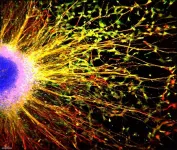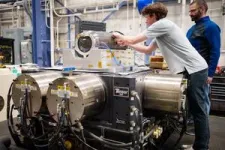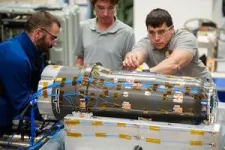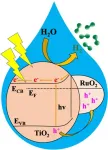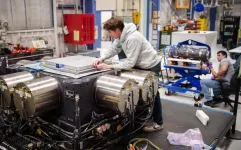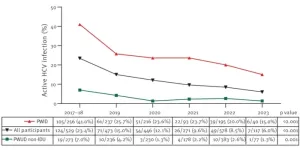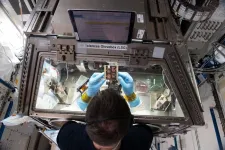(Press-News.org) An experimental cancer drug could make thinking easier for individuals with Rett syndrome, a rare disorder linked to autism, according to new research from the University of California San Diego — a discovery that could lead to therapies for patients with other neurological conditions.
The findings, published July 25 in Stem Cell Reports, highlight the role of microglia — a type of white blood cell found in the central nervous system — in the formation of the human brain.
While such cells have been better studied in neurodegenerative disorders like Alzheimer’s disease, amyotrophic lateral sclerosis (ALS) and multiple sclerosis, “very little information has existed on their role in early stages of neural development” because access to fetal tissue is limited, said Pinar Mesci, Ph.D., the study’s lead researcher. Now employed elsewhere, she completed work on the project while at the university.
In a bid to better understand their function, Mesci instead used brain organoids — “mini brains,” essentially, that mimic the developing brain of an embryo — grown from skin-derived stem cells of consenting patients. Such organoids were created from individuals with Rett syndrome — a disorder primarily found in females that features loss of speech, purposeful use of hands, mobility and muscle tone, among other symptoms — as well as from neurotypical individuals.
Mesci then added healthy microglia to the Rett syndrome brain organoids and found that the functioning of synapses — where neurons connect and communicate — was “rescued.” This occurred due to the restoration of phagocytosis, a process by which microglia — sometimes referred to as the “janitors” of the central nervous system — ingest and destroy foreign substances like bacteria and dead cells, keeping the brain and spinal cord tidy. The process also involves “pruning” of synapses, which optimizes brain function.
Researchers also found that the synapses of typical neurons experienced impaired functioning when Rett syndrome microglia were introduced, further confirming the role of the immune cell in brain function and development.
“If the brain’s ‘janitors’ are not working, problems start to arise,” said UC San Diego School of Medicine professor Alysson Muotri, Ph.D., senior author and director of the university’s Sanford Stem Cell Institute's Integrated Space Stem Cell Orbital Research Center.
Faulty microglia make cognition even harder for Rett syndrome patients, who already contend with fewer and impaired synapses and dysfunctional astrocytes due to a loss of function in the MECP2 gene, implicated in other types of neurodevelopmental conditions as well.
Microglia with loss of MECP2 function “are not as good at pruning synapses and shaping the neural network — they don’t do a good job,” Muotri said.
The team then tested a battery of existing drugs on the microglia, to see if any might restore phagocytosis. They found one: ADH-503, also known as GB1275 — an experimental oral pancreatic cancer medication that also reduces the number of immune-supressing cells that enter a tumor. The drug serves as a regulator of CD11b, a protein involved in phagocytosis, among other processes.
Other studies on Rett syndrome have highlighted potential therapeutic targets. But none so far have identified a potential treatment involving human microglial cells.
By the time Rett syndrome patients are diagnosed, it’s too late to repair and not currently possible to replace faulty neurons, the primary issue in the disease. “But by focusing on other cell types — and potentially finding drugs that improve how they work — we might improve the environment for those neurons and ease functioning for patients,” Mesci said. “That’s what I’m excited about.”
Jonathan Kipnis, Ph.D., professor of pathology, immunology, neurology, neuroscience and neurosurgery at Washington University School of Medicine in St. Louis and director of its Brain Immunology and Glia Center, said the new research “nicely demonstrates” microglia as a potential therapeutic target in Rett syndrome.
“I hope this work will ‘move the needle’ and bring the Rett community back to neuroimmunology,” Kipnis said. “Understanding neuro-immune interactions in this complex disease may not only provide new insights into the disease biology, but also develop novel approaches to attenuate its progression.”
The research represents the first successful integration of human microglia into Rett syndrome brain tissues in vitro — a model that may prove superior to mouse models.
The researchers hope the study “opens doors for therapies,” not only for those with Rett syndrome, but for those with other neurodevelopmental and neurodegenerative disorders in which microglia play a role.
“That’s my wish,” Mesci said, “that we can improve quality of life.”
Co-authors of the study include Christopher LaRock, with the Department of Pediatrics at the University California San Diego School of Medicine and Skaggs School of Pharmacy and Pharmaceutical Sciences; Jacob J. Jeziroski, Natalia Chermount, Tomoka Ozaki, Aurian Saleh, Cedric E. Snethlage, Sandra Sanchez, Gabriela Goldberg, Clever A. Trujillo and Kinichi Nakashima, with the University of California San Diego School of Medicine and Department of Pediatrics at Rady Children’s Hospital San Diego, and the Department of Cellular & Molecular Medicine; Hideyuki Nakashima, with the Department of Stem Cell Biology and Medicine at Kyushu University’s Graduate School of Medicine; Adriano Ferrasa, with the Experimental Multiuser Labratory at the Graduate Program in Health Sciences at the School of Medicine at Pontifícia Universidade Católica do Paraná in Curitiba, Paraná, Brazil, as well as the Department of Informatics at the Universidade Estadual de Ponta Grossa in Ponta Grossa, Parana, Brazil; Roberto H. Herai, with the Experimental Multiuser Labratory at the Graduate Program in Health Sciences at the School of Medicine at Pontifícia Universidade Católica do Paraná in Curitiba, Paraná, Brazil, and the Research Department at Lico Kaesemodel Institute in Curitiba, Paraná, Brazil; and Victor Nizet, with the Department of Pediatrics at the University California San Diego School of Medicine and Skaggs School of Pharmacy and Pharmaceutical Sciences.
This work was made possible in part by the California Institute for Regenerative Medicine (CIRM) Major Facilities grant (FA1-00607) to the Sanford Consortium for Regenerative Medicine. Muotri is supported by the National Institutes of Health (NIH) R01MH107367, R01HD107788, R01NS105969 and R01NS123642, and a grant from the International Rett Syndrome Foundation (IRSF). This work was also partially funded by the IRSF Innovation Award granted to Mesci (grant No. 3905). Herai is funded by Fundação Araucária (grant No. FA09/2016). This work was also partially funded by AMED (JP22mg1310008), an Intramural Research Grant (3-9) for Neurological and Psychiatric Disorders of NCNP grant to Nakashima and a Japan Society for the Promotion of Science (JSPS) KAKENHI (JP22K15201) to Nakashima. This publication includes data generated at the UC San Diego IGM Genomics Center utilizing an Illumina NovaSeq 6000 that was purchased with funding from an NIH SIG grant (No. S10 OD026929).
Disclosures: Muotri is a co-founder and has an equity interest in TISMOO, a company dedicated to genetic analysis and human brain organogenesis focusing on therapeutic applications customized for autism spectrum disorder and other neurological disorders with genetic origins. The terms of this arrangement have been reviewed and approved by the University of California San Diego in accordance with its conflict-of-interest policies. The authors have a patent application in the works related to this publication.
About the Sanford Stem Cell Institute
The UC San Diego Sanford Stem Cell Institute (SSCI) is a global leader in regenerative medicine and a hub for stem cell science and innovation in space. SSCI aims to catalyze critical basic research discoveries, translational advances and clinical progress — terrestrially and in space — to develop and deliver novel therapeutics to patients.
# # #
END
Cancer drug could ease cognitive function for some with autism
New research highlights a therapeutic target that could make thinking easier for patients with a variety of neurologic disorders
2024-07-25
ELSE PRESS RELEASES FROM THIS DATE:
Oregon State University research uncovers better way to produce green hydrogen
2024-07-25
CORVALLIS, Ore. – Researchers at Oregon State University have developed a material that shows a remarkable ability to convert sunlight and water into clean energy.
A collaboration led by Kyriakos Stylianou of the OSU College of Science created a photocatalyst that enables the high-speed, high-efficiency production of hydrogen, used in fuel cells for cars as well as in the manufacture of many chemicals including ammonia, in the refining of metals and in making plastics.
The findings represent a potential new tool to use against greenhouse gas emissions and climate change, said Stylianou, whose research focuses ...
Transforming environmental testing one shake at a time
2024-07-25
ALBUQUERQUE, N.M. — Testing weapons and components in a lab-controlled environment has always been at the center of Sandia National Laboratories’ mission. Since the U.S. stopped underground explosives tests on weapons in the early 1990s, Sandia has developed other methods to conduct experiments that mimic the range of environments a weapons unit might experience. A newly developed method is getting better results, with fewer tests, in less time.
“Our job in the laboratory is to simulate the environment and lifetime of stress ...
Midwestern launches public research profiles through Symplectic Elements
2024-07-25
Digital Science, a technology company serving stakeholders across the research ecosystem, is pleased to share the news that Midwestern University has successfully launched a new faculty profiles portal powered by Symplectic Elements.
Midwestern has been utilizing Symplectic Elements as its Research Information Management System since 2019, and has made the decision to expand its use by adding public profiles. The faculty profiles repurpose the comprehensive data already within Elements to populate enhanced profiles, including biographical information as ...
Accelerating motor neurone disease research by harnessing the power of health data
2024-07-25
MND is a devastating disease affecting the motor neurones in the brain and spinal cord, leading to progressive muscle weakness and paralysis. Despite decades of research, several scientific challenges continue to impede the development of effective therapies for the thousands of people living with MND in the UK.
The MND Research Data Catalyst is a new initiative led by HDR UK and DPUK, with the UK Dementia Research Institute (UK DRI) and in partnership with the MND research community, to accelerate the discovery of new diagnostics, treatments and support better care for MND patients. This will be achieved by harnessing the UK’s trustworthy, large-scale health ...
World Hepatitis Day 2024: Madrid study shows decrease in active hepatitis C infection among risk groups, indicating effectiveness of public health measures
2024-07-25
A study conducted through a mobile screening unit in Madrid, Spain from 2017 to 2023 and published in Eurosurveillance found that active hepatitis C virus (HCV) infection decreased from 23% to 6% in that period among people who use drugs (PWUD) that visited the unit. The study found that the use of intravenous drugs was the most significant risk factor for infection among PWUD. It confirmed that HCV screening and treatment programmes targeting this at-risk population are effective and can help achieve the World Health Organization goal of HCV elimination as public health threat by 2030.
Study participants and methods
Participants were recruited in ‘hotspots’ ...
After Trump’s election, women of color had more underweight, premature babies, study finds
2024-07-25
In 2016, President-elect Donald Trump vowed to deport thousands of immigrants. His anti-immigration message vilified foreign-born people living in the U.S. as criminals and rapists. Besides making good on many harsh, immigration-related promises, the years after his election stoked the anxieties of millions of people.
Now, with Trump once again in contention for the White House, a new study from the University of California, Berkeley, reveals the surprising — and potentially lifelong — association between those early Trump years and the health of society's newest citizens.
In ...
Space-trekking muscle tests drugs for microgravity-induced muscle impairment
2024-07-25
A gentle rumble ran under Ngan Huang’s feet as a rocket carrying her research—live, human muscle cells grown on scaffolds fixed on tiny chips—lifted off, climbed, and disappeared into the sky to the International Space Station National Laboratory. These chips would help Huang better understand muscle impairment, often seen in astronauts and older adults, and test drugs to counter the condition.
Now, the results are back. Reporting in a study published July 25 in Stem Cell Reports, Huang’s team showed that space-travelling muscle had metabolic changes that indicate ...
In clinical trial, fecal matter transplant helped half of patients with gastrointestinal cancers overcome resistance to immunotherapy treatment
2024-07-25
Findings from a small, proof-of-concept clinical trial have suggested that fecal microbiota transplants (FMTs) can boost the effectiveness of immunotherapy in a range of gastrointestinal cancers. In the study, published July 25 in the journal Cell Host & Microbe, six of 13 patients who had previously shown resistance to immune checkpoint inhibitors benefited from receiving FMTs from donors who had previously responded to treatment. The investigators also identified specific strains of bacteria associated with better or worse responses to FMT and immune checkpoint drugs.
“This research highlights the complex interplay between beneficial ...
Royal Ontario Museum scientist identifies Great Salt Lake as a significant source of greenhouse gas emissions
2024-07-25
Newly announced research by Royal Ontario Museum (ROM) examining greenhouse gas emissions from the drying lake bed of Great Salt Lake, Utah, calculates that 4.1 million tons of carbon dioxide and other greenhouse gases were released in 2020. This research suggests that drying lake beds are an overlooked but potentially significant source of greenhouse gases, which may further increase due to climate change. These results were announced in the paper, “A desiccating saline lake bed is a significant source of anthropogenic greenhouse gas emissions,” published in the journal One Earth.
“Human-caused ...
Provision of stroke care services by community disadvantage status
2024-07-25
About The Study: Hospitals in communities with the greatest level of socioeconomic disadvantage had the lowest likelihood of becoming stroke certified while hospitals in the most advantaged communities had the highest likelihood in this cohort study. These findings suggest that there is a need to support hospitals in disadvantaged communities to obtain stroke certification as a way to reduce stroke disparities.
Corresponding Author: To contact the corresponding author, Renee Y. Hsia, M.D., M.Sc., email renee.hsia@ucsf.edu.
To access the embargoed study: Visit our For The Media website at this link ...
LAST 30 PRESS RELEASES:
Cost of copper must rise double to meet basic copper needs
A gel for wounds that won’t heal
Iron, carbon, and the art of toxic cleanup
Organic soil amendments work together to help sandy soils hold water longer, study finds
Hidden carbon in mangrove soils may play a larger role in climate regulation than previously thought
Weight-loss wonder pills prompt scrutiny of key ingredient
Nonprofit leader Diane Dodge to receive 2026 Penn Nursing Renfield Foundation Award for Global Women’s Health
Maternal smoking during pregnancy may be linked to higher blood pressure in children, NIH study finds
New Lund model aims to shorten the path to life-saving cell and gene therapies
Researchers create ultra-stretchable, liquid-repellent materials via laser ablation
Combining AI with OCT shows potential for detecting lipid-rich plaques in coronary arteries
SeaCast revolutionizes Mediterranean Sea forecasting with AI-powered speed and accuracy
JMIR Publications’ JMIR Bioinformatics and Biotechnology invites submissions on Bridging Data, AI, and Innovation to Transform Health
Honey bees navigate more precisely than previously thought
Air pollution may directly contribute to Alzheimer’s disease
Study finds early imaging after pediatric UTIs may do more harm than good
UC San Diego Health joins national research for maternal-fetal care
New biomarker predicts chemotherapy response in triple-negative breast cancer
Treatment algorithms featured in Brain Trauma Foundation’s update of guidelines for care of patients with penetrating traumatic brain injury
Over 40% of musicians experience tinnitus; hearing loss and hyperacusis also significantly elevated
Artificial intelligence predicts colorectal cancer risk in ulcerative colitis patients
Mayo Clinic installs first magnetic nanoparticle hyperthermia system for cancer research in the US
Calibr-Skaggs and Kainomyx launch collaboration to pioneer novel malaria treatments
JAX-NYSCF Collaborative and GSK announce collaboration to advance translational models for neurodegenerative disease research
Classifying pediatric brain tumors by liquid biopsy using artificial intelligence
Insilico Medicine initiates AI driven collaboration with leading global cancer center to identify novel targets for gastroesophageal cancers
Immunotherapy plus chemotherapy before surgery shows promise for pancreatic cancer
A “smart fluid” you can reconfigure with temperature
New research suggests myopia is driven by how we use our eyes indoors
Scientists develop first-of-its-kind antibody to block Epstein Barr virus
[Press-News.org] Cancer drug could ease cognitive function for some with autismNew research highlights a therapeutic target that could make thinking easier for patients with a variety of neurologic disorders
